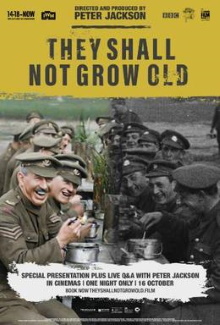This is Peter Jackson’s documentary about the experience of British soldiers during the First World War. While it features both archival footage and voice recordings of veterans, it is the voices that dominate this film, so much so that the images largely fade into the background. Used as we are to war films, there is little that is new to be learned here but hearing the first-hand testimony of the survivors of the war recount their experiences still makes this an affecting film.
Without individually identifying the interlocutors or even providing details of precise dates and places, this film consists entirely of oral testimonies of many British soldiers who fought in the First World War without the additional commentary of any narrator. Images accompany the testimonies of course, sometimes photographs, mostly video archives including some colorized and animated to make them feel more vivid. The images are well-chosen and do help to focus your attention but the real draw here are the memories of the war veterans, recounted in their own voices and words. They served in many different parts of the military but this film roughly organizes them in chronological order from the moment they realized that the UK is at war with Germany, to volunteering to serve as a soldier, to basic training and deployment and to the routine reality of being on frontline duty in the trenches. It ends with especially brutal accounts of the final offensives that led to the end of the war and the soldiers’ thoughts of their return to civilian life.
The film is full of mundane detail, such as their deployment schedules, the equipment they were issued with, how they had to carry and prepare their own personal food while in the trenches and so on. All this is of course fascinating but they are not especially surprising as these facts fit the general shape of what everyone knows by now primed as we have been from numerous films and other media. It is still striking how naïve and idealistic the young recruits were, being absolutely confident that this would be a short war and Britain’s victory inevitable. So many of them lied about their age to sign up and the recruiters went along with the lies as well. Others were shamed into signing up by girls in the street or because everyone else was doing it. Another thing that struck me was that the government knew exactly what it was doing even was the recruits didn’t. Every detail of their training and the kit they are issued with, the food they are given and their schedules were all carefully and in a way, very cynically, engineered decisions. For example the soldiers talk about how ridiculous it is that they are expected to be perfectly smartened up after being sent to rest behind the lines following a shift on the front and yet not being issued equipment to polish their buttons. But it seems clear that this is an imposition of a very carefully considered measure of military discipline and to mold the behavior of the soldiers towards what is desired.
While just about everyone seemed to have entered the war in high spirits and confident that it would be an easy war well worth fighting, those who survived it were all thoroughly disabused of their idealism by the end and rail against how pointless and wasteful it all was. When they returned home, they had difficulty finding jobs and fitting back into a society that pretty much went on as usual while they were gone. As they all note, it was impossible for civilians to understand what they had gone through. This is, I think, a good thing. While no doubt people can still be convinced to engage in wars if their living conditions are so horrible that they have no recourse but to fight for something better, I think it is much harder now to convince large masses people to sacrifice their lives for distant leaders without direct benefit for themselves. War films and documentaries such as this help by piercing the romanticism of war and destroying the myth that any violence can ever be clean and heroic.
Anyway this is a truly valuable documentary even if you already know a lot about the First World War as it really gets across what it felt like to be a soldier on the frontlines. The added animations and colorization work do add to the impact but they are kind of distracting as well and not really necessary. I think the intent was to better convey the sense that they are real people but the voices alone are enough for me.
